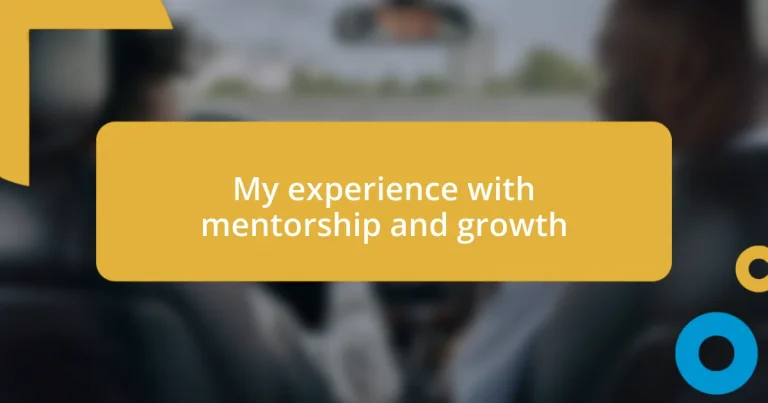Key takeaways:
- Mentorship is a reciprocal relationship that fosters growth for both mentor and mentee through shared experiences and open communication.
- Identifying the right mentor involves aligning values and communication styles, ensuring their support and commitment to your development.
- Setting clear mentorship goals and being adaptable to change are crucial for maintaining focus and accountability in the mentorship journey.
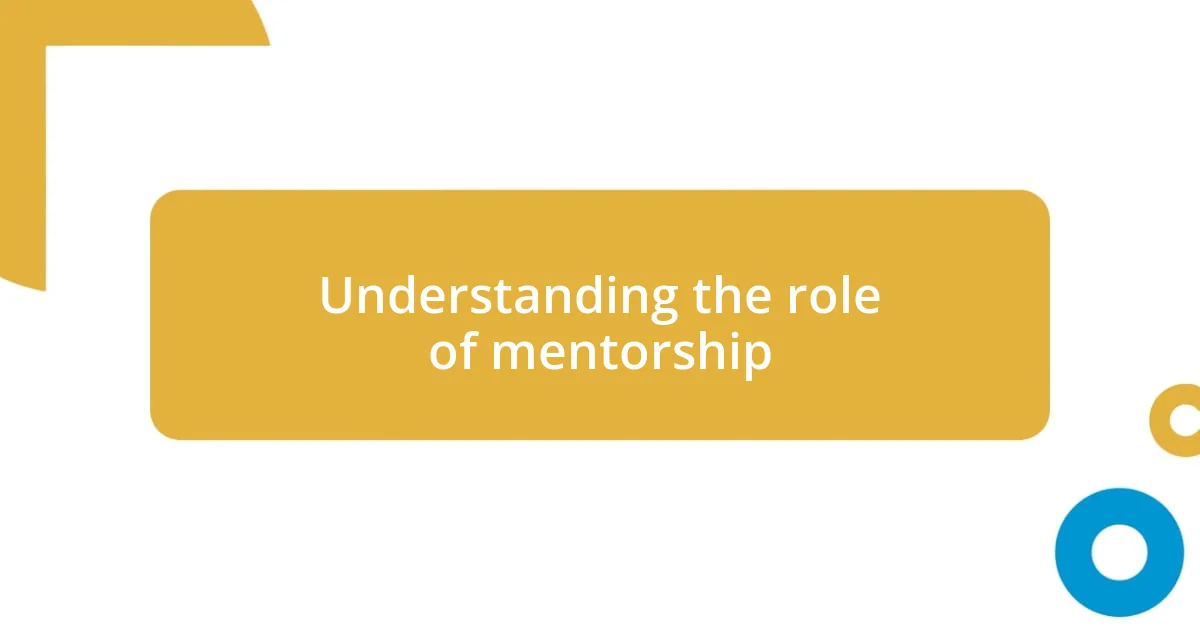
Understanding the role of mentorship
Mentorship plays a pivotal role in personal and professional development. I remember a time when I felt completely lost in my career choices; it was a mentor who guided me through that confusion, sharing their own experiences and insights. Isn’t it fascinating how a single conversation can open doors that seemed firmly shut?
When I think about mentorship, I often reflect on the emotional bond that develops between a mentor and a mentee. It’s not just about sharing expertise; it’s about fostering trust and understanding. There were days when my mentor’s encouragement pulled me out of self-doubt, and that support made all the difference. Can you recall a moment when someone believed in you, even when you struggled to believe in yourself?
The beauty of mentorship lies in its reciprocal nature. While I gained valuable knowledge, my mentor, too, was inspired by my fresh perspectives. This dynamic relationship can lead to growth for both parties. Have you ever considered how mentoring someone else might transform your own understanding and skills? It’s an enriching experience that often goes beyond just the transfer of knowledge.
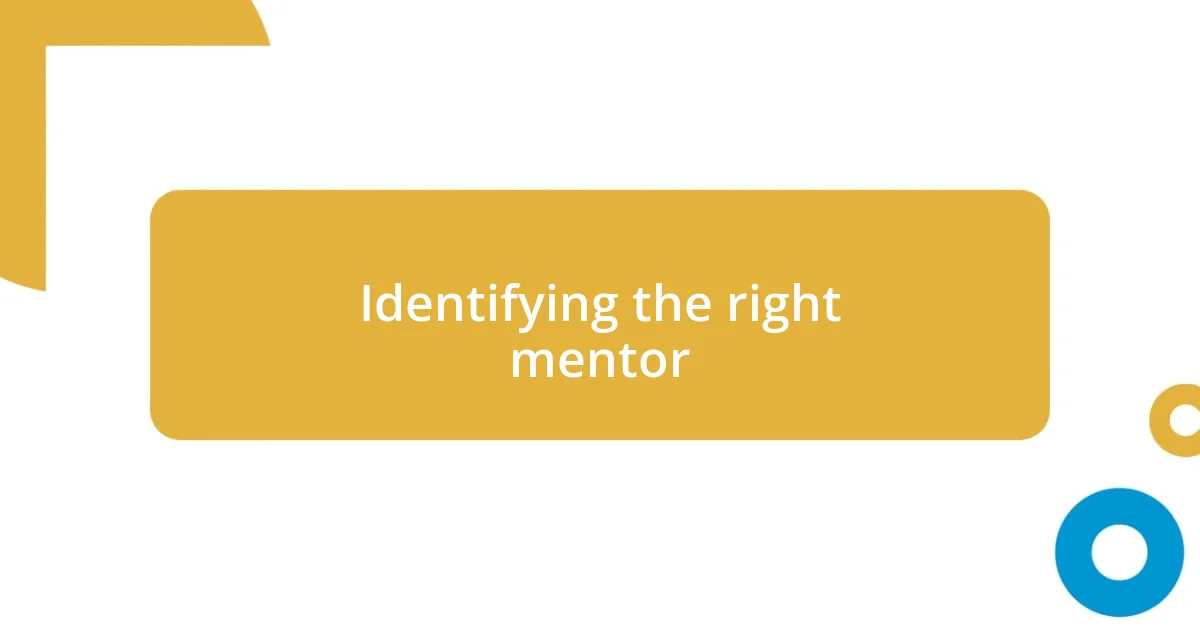
Identifying the right mentor
Identifying the right mentor can be a transformative step in your growth journey. I learned early on that not all mentors suit every situation. For me, it was about aligning values and career goals. Finding someone who not only has the expertise but also resonates with my aspirations made all the difference. I remember chatting with a potential mentor over coffee and realizing we shared similar passions. That connection sparked a deeper level of understanding and respect.
When looking for the right mentor, consider these essential factors:
- Relevant Experience: Ensure they have a background that aligns with your professional interests.
- Communication Style: Their way of sharing knowledge should resonate with you. Do they inspire you?
- Willingness to Invest Time: A good mentor should show genuine interest in your growth.
- Shared Values: Look for someone whose values and ethics mirror yours.
- Supportive Nature: They should encourage you through failures and celebrate your successes.
By keeping these points in mind, you’ll be better equipped to find someone who can truly elevate your journey.
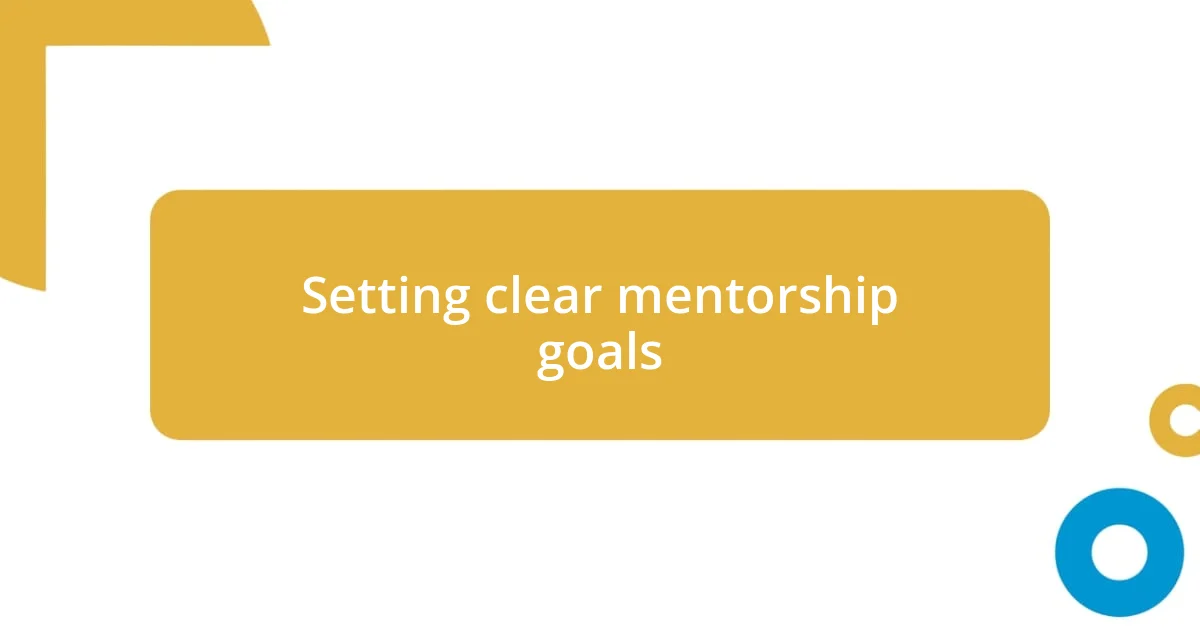
Setting clear mentorship goals
Setting clear goals for mentorship is crucial in ensuring the relationship remains productive and focused. I remember when I first started my mentorship journey; I was unsure about what I wanted to achieve. So, I took a moment to reflect on my career aspirations and mapped out specific goals. It was enlightening to see how defining these objectives transformed our discussions from casual chats into strategic sessions aimed at my growth.
Additionally, the clarity in goals served as a framework for accountability. Once my mentor and I settled on the objectives, it created a mutual understanding of what success would look like throughout our engagement. I recall a time when my mentor reminded me of our set goals after I got sidetracked by a less relevant opportunity. It was this gentle nudge that brought me back on track, reinforcing the importance of having those goals in place.
Lastly, I found that revisiting and adjusting my mentorship goals periodically is essential. Growth is not always linear; as I evolved, so did my aspirations. My mentor encouraged me to reassess my goals every few months, allowing us to realign our focus. This adaptability not only enriched my experience but also fostered a deeper connection with my mentor, creating an environment where both our expectations could thrive.
| Aspect | Importance |
|---|---|
| Clarity of Goals | Directs focus and communication |
| Accountability | Fosters mutual responsibility in the mentorship |
| Adaptability | Allows for growth and changes in aspirations |
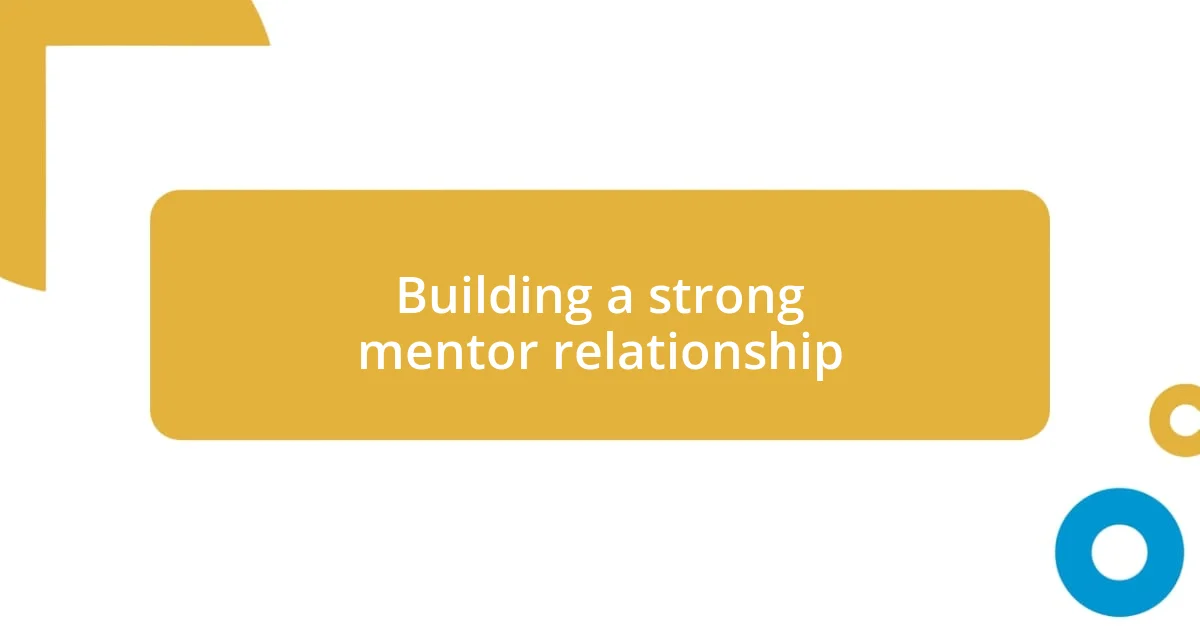
Building a strong mentor relationship
Building a strong mentor relationship really relies on open and honest communication from the get-go. I vividly recall when I made a misstep and hesitated to share it with my mentor. It wasn’t until I opened up about my struggles that I felt the weight lifted and, in response, received invaluable advice. Have you ever felt that a mentor could help, but you were afraid to show vulnerability? I’ve learned that sharing not just my successes but also my challenges created a deeper trust and connection.
Trust is the cornerstone of any effective mentorship. I remember one session where I was hesitant to ask for feedback on a project. It took a bit of courage for me to speak up, but the moment I did, my mentor praised my initiative while also offering constructive suggestions. That experience taught me that trusting your mentor with your professional growth leads to richer discussions. Are you ready to embrace that level of transparency in your own relationships?
Lastly, I found that mutual respect and appreciation are vital in nurturing a mentor-mentee bond. It’s essential to recognize the sacrifices mentors make; that acknowledgment can transform the dynamic. I often express gratitude, whether through a simple thank-you note or sharing my progress with them. It’s an energizing exchange! Have you expressed appreciation for those guiding you? Such gestures not only strengthen the relationship but also make each interaction feel meaningful and valued.
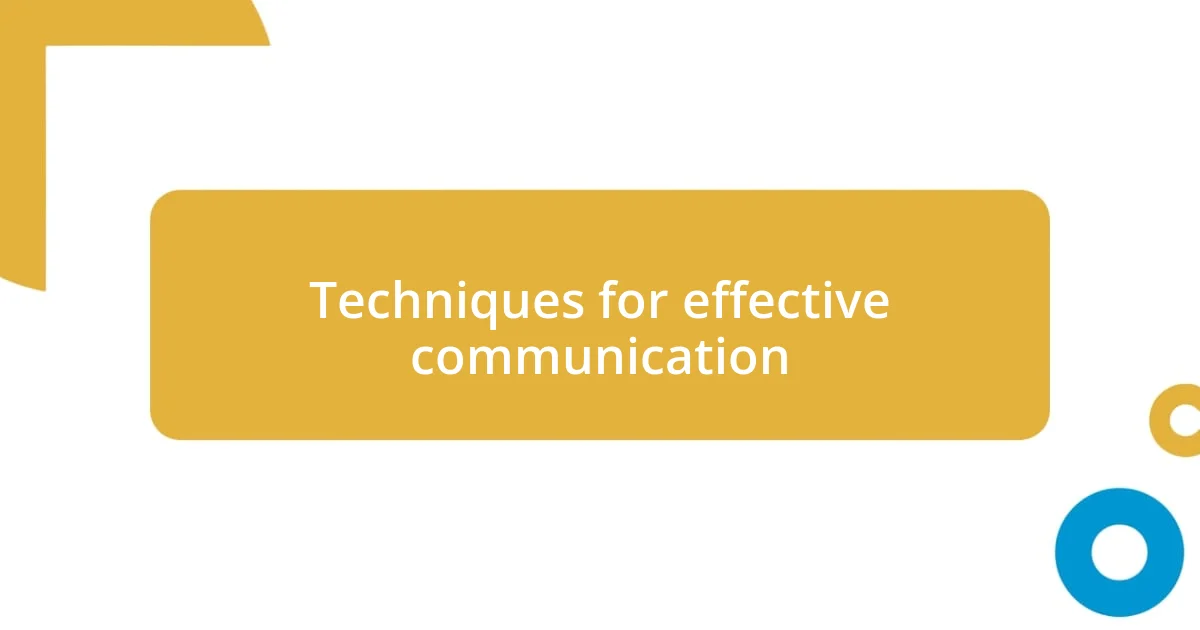
Techniques for effective communication
Effective communication in mentorship requires active listening. I remember attending a mentoring session where my mentor shared some insightful advice, but I was so eager to respond that I missed out on some valuable points. I’ve come to realize that by truly immersing myself in the listening process, I can extract nuances that would otherwise pass by unnoticed. Have you ever found yourself so focused on your next thought that you missed what was right in front of you? Embracing active listening can significantly enhance the quality of the conversation and deepen mutual understanding.
Another essential technique is to ask open-ended questions. During one of my meetings with a mentor, I made it a point to steer the conversation with questions that required more than just a ‘yes’ or ‘no’ answer. One query led to a rich discussion about industry trends that I hadn’t even considered before. It dawned on me that these types of questions not only keep the dialogue flowing but also encourage exploration beyond surface-level topics. What questions are you asking in your conversations? The right ones can unlock doors to incredible insights.
Finally, non-verbal communication is often overlooked yet carries significant weight. There was an instance when I noticed my mentor’s body language shift—it told me more than their words could express. Understanding these signals can inform how I respond and adjust my approach accordingly. It’s a reminder that our physical cues can reinforce or contradict our messages. Are you aware of your body language when communicating? Being mindful of this aspect can elevate your interactions, making them more authentic and constructive.
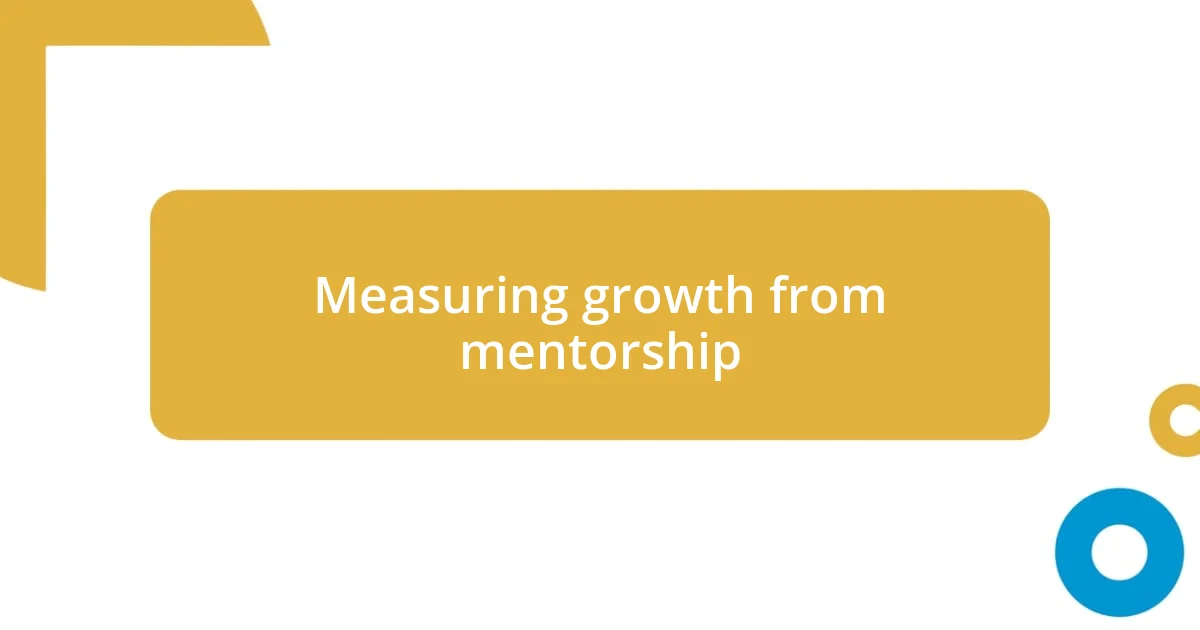
Measuring growth from mentorship
When it comes to measuring growth from mentorship, I often reflect on the shifts in my mindset. For instance, I distinctly remember a moment when I received feedback that initially stung. Instead of defensively brushing it off, I internalized it, transforming it into a stepping stone for improvement. Have you ever felt that initial urge to resist criticism, only to later realize its value? That experience not only refined my skills but also deepened my appreciation for constructive feedback as a growth tool.
I’ve also noticed that tracking progress isn’t just about tangible results—it’s about the intangible changes too. For instance, after a series of mentorship meetings, I found myself feeling more confident in my decision-making. This newfound confidence was a significant shift from my earlier self-doubt. I started making choices based on my own evaluations rather than seeking validation at every turn. Do you ever pause to consider how mentorship influences your self-belief? Recognizing this part of growth can be incredibly empowering, reminding us that mentorship touches on multiple aspects of our development.
Finally, I measure growth not only by my accomplishments but also by the evolution of my relationships. There was a fascinating moment when a peer reached out to me for advice, attributing much of their progress to my earlier conversations with them. That realization struck a chord within me. I had not only benefited from mentorship but had also started to pay it forward. How do you view your impact on others? Acknowledging this ripple effect of influence can be a powerful indicator of growth, suggesting that mentorship is truly a two-way street.
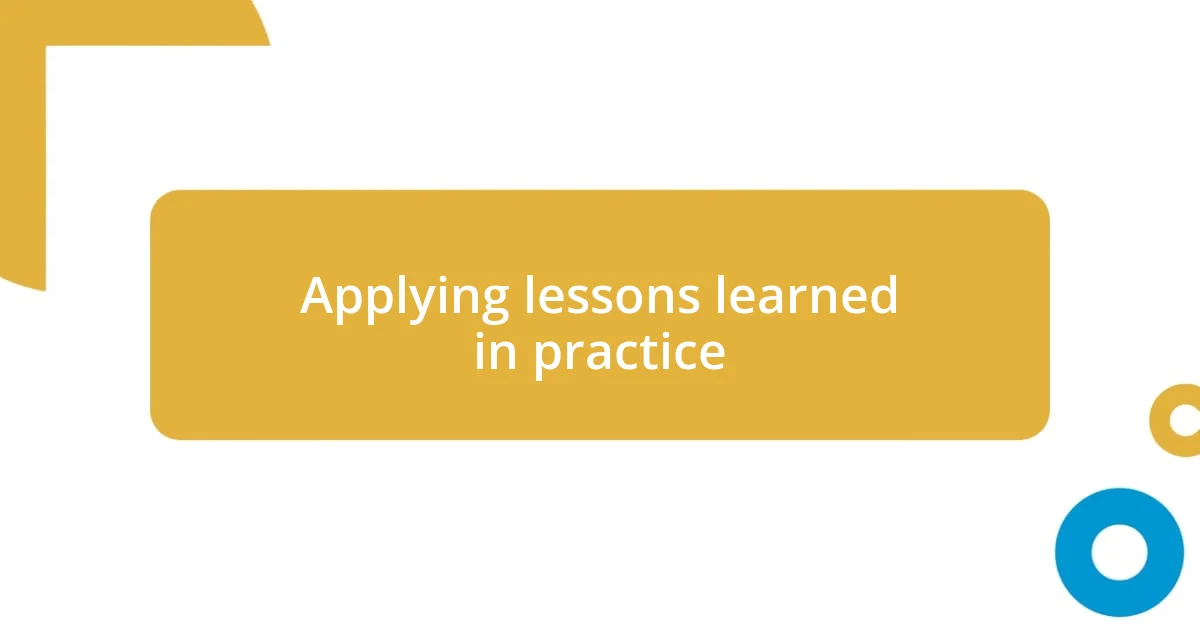
Applying lessons learned in practice
Applying lessons from mentorship in practice has been a transformative journey for me. One particular instance stands out: I once learned the art of giving and receiving feedback effectively during a mentorship session. My mentor emphasized the importance of framing suggestions positively. The next time I offered feedback to a colleague, I carefully chose my words, and I was amazed to see how it shifted the entire atmosphere of the conversation. Have you ever noticed how words can inspire rather than diminish? I realized that when we approach feedback correctly, it opens the door to growth instead of defensiveness.
In another instance, I remember feeling overwhelmed with a challenging project. I decided to apply the strategic thinking techniques my mentor taught me. By breaking down the project into smaller, manageable tasks, I not only alleviated my stress but also enhanced my productivity. This method reinforced my understanding that mentorship isn’t just about learning; it’s about applying those lessons in real-life scenarios to create tangible outcomes. Have you ever felt that sense of relief when a complicated task suddenly seems achievable? I did, and it was empowering.
One of the most enlightening lessons was learning about the power of vulnerability. During a difficult period, I reached out to my mentor and shared my struggles with imposter syndrome. Their empathy not only validated my feelings but also made me realize that sharing our challenges can forge deeper connections. This led me to open up more within my team, creating an environment where others felt comfortable sharing as well. What are your thoughts on vulnerability in leadership? From my experience, embracing it can truly foster a culture of support and collaboration, transforming how we all grow together.












